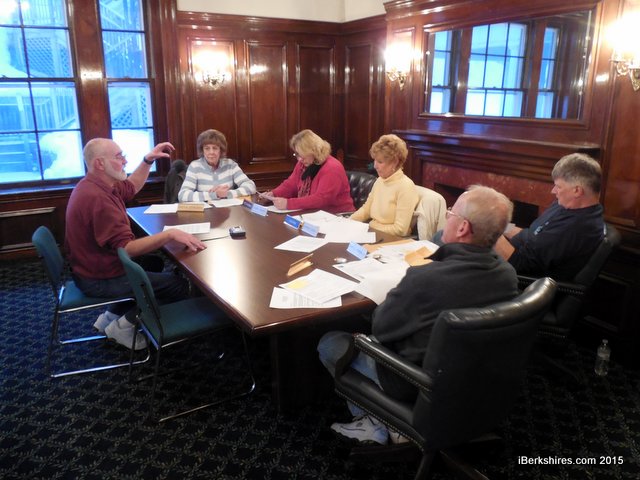Adams Planners OK Haunted Artifacts Museum Site Plan
 John Zaffis, left, explains his plans for a paranormal museum to the Planning Board on Monday night. John Zaffis, left, explains his plans for a paranormal museum to the Planning Board on Monday night. |
ADAMS, Mass. — Paranormal researcher John Zaffis' site plan for his Paranormal Artifact Museum has received approval from the Planning Board.
Paranormal researcher and host of Syfy show "Haunted Collector" met with the Planning Board on Monday night to go over the site plan of his proposed museum in the old McBride Funeral Home.
The Liberty Street museum would house some of the haunted artifacts he has removed from various locations throughout his more than 40 years of paranormal investigating. He added he also plans to host lectures, ghost hunts and weddings.
Zaffis said the lecture hall has a beautiful backdrop for a more unique wedding.
"What I mean when I say chapel is that some people are very interested in getting married in creepy places," Zaffis said. "It's a popular thing."
Zaffis said he considers it another revenue stream for his business and has been collecting Halloween items for the past 40 years.
"I have a lot of different mannequins and things I wanted to set up there," he said. "If someone is interested, which I am sure will be a very big thing, in having a minister or someone come in and marry them in front of the creepy display I'd set up, knock your socks off."
Zaffis said much of the interior and exterior of the building will remain the same. He plans to paint the exterior of the funeral home gray and white with black shutters and touch up the paint inside and provide more lighting where needed.
He said he looked at more than 100 properties and the McBride Funeral Home, which closed several years ago, is by far his favorite.
"I love the way it was laid out it was perfect the way the rooms are," he said. "I don't have to alter anything … at this point in time as far as alterations, there isn't much I want to do. I love it the way it is."
Zaffis said the external lighting should be ample and there will be handicapped ramps and plenty of parking.
Although the building is perfect for his needs, he does not think many ghosts haunt the funeral home and assured the board his haunted artifacts would be the main point of investigation.
"I don't think there is really much with the building, and it is more so with my items because all of those have been removed from haunted locations," he said. "I think people will be more interested in that than just per say the building."
These "ghost hunts" will primarily take place on weekends in the evenings and early mornings. He said the tours and museum operation will be by appointment and not random.
"The people that are in there, they are interested in looking at the items and doing their EVPs, psychic photography and all that happy stuff hoping capture something," Zaffis said.
Although there are no directly abutting neighbors, Chairwoman Barbara Ziemba was concerned of patrons screaming when they came upon something unexpected on a ghost hunt.
Zaffis said people interested in the paranormal are quieter then often expected.
"I very seldom have any screaming or yelling," he said. "People today are so interested in learning and understanding the paranormal," he said. "I have done many events over the years and never really had anybody screaming."
Although the board approved the plan, planners asked that Zaffis add more detail and show parking spaces, abutters, utilities, and green space among other things.
Zaffis said once all permitting is in order, he will purchase the property and really get everything moving.
Tags: haunted, museum, paranormal, Planning Board,















